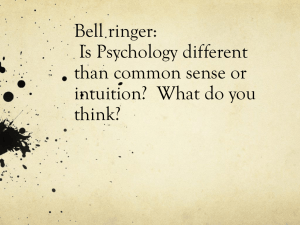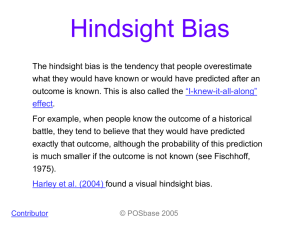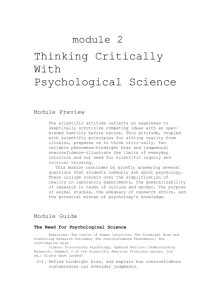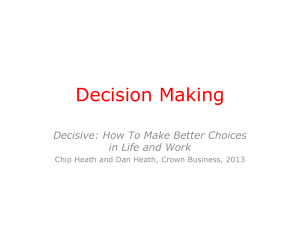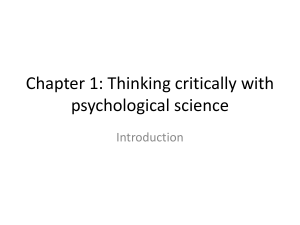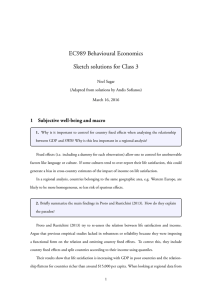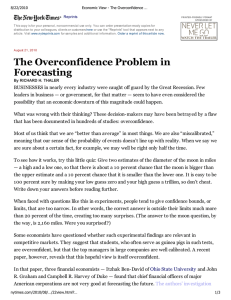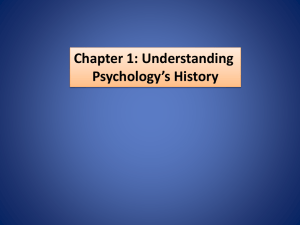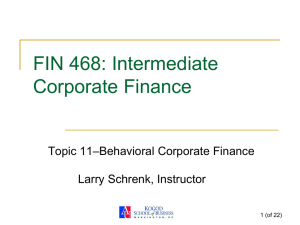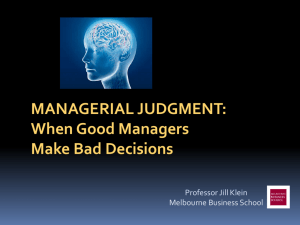a PowerPoint presentation of Module 2
advertisement
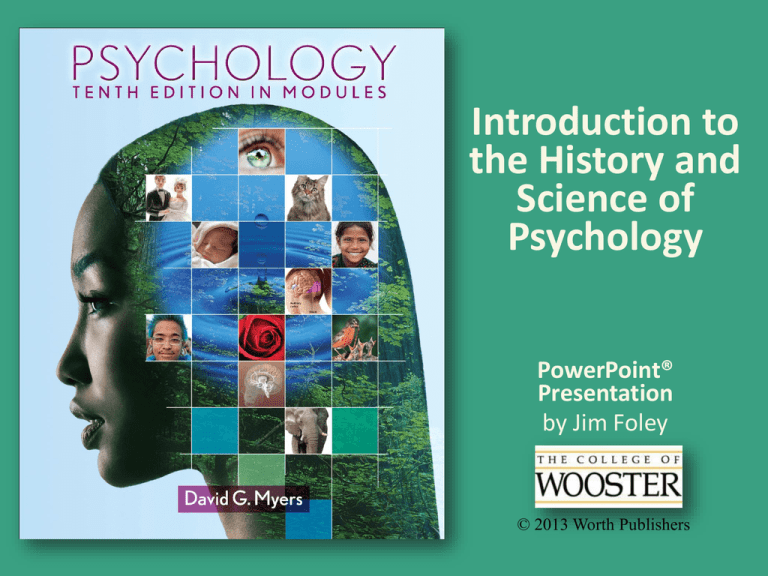
Introduction to the History and Science of Psychology PowerPoint® Presentation by Jim Foley © 2013 Worth Publishers Module 2: Thinking Critically with Psychological Science Which of the following is TRUE? A. Hypnosis is an effective way to help people relive long-buried or repressed memories. B. Electroconvulsive therapy is no longer used. C. Most people do not suffer from unrealistically low self-esteem. D. Opposites generally attract. “Think critically” with psychological science… does this mean “criticize”? Critical thinking refers to a more careful style of forming and evaluating knowledge than simply using intuition. In addition to the scientific method, critical thinking will help us develop more effective and accurate ways to figure out what makes people do, think, and feel the things they do. Why do I need to work on my thinking? Can’t you just tell me facts about psychology? • The brain is designed for surviving and reproducing, but it is not the best tool for seeing ‘reality’ clearly. • To improve our thinking, we will learn to catch ourselves in some critical thinking errors. When our natural thinking style fails: Hindsight bias: “I knew it all along.” The coincidence error, or mistakenly perceiving order in random events: “The dice must be fixed because you rolled three sixes in a row.” Overconfidence error: “I am sure I am correct.” Hindsight Bias Classic example: after watching a competition (sports, When you see most cooking), if you don’t results of You make were athis prediction accepted I knew psychological would ahead into of time, this you research, happen… you might college/university might make a say, “that was “postdiction”: “I obvious…” figured that team/person would win because…” Hindsight bias is like a crystal ball that we use to predict… the past. Absence makes the heart grow fonder Out of sight, out of mind You can’t teach an old dog new tricks You’re never too old to learn Good fences make good neighbors No [wo]man is an island Birds of a feather flock together Opposites attract Seek and ye shall find These sayings But then why all do Curiosity killed the cat seem to make sense, these other inphrases hindsight, we alsoafter seem read them. to make sense? Look before you leap S/He who hesitates is lost The pen is mightier than the sword Actions speak louder than words The grass is always greener on the other side of the fence There’s no place like home Overconfidence Error 1: Overconfidence Error 2: Performance Accuracy We are much too certain in our judgments. We overestimate our performance, our rate of work, our skills, and our degree of self-control. Test for this: “how long do you think it takes you to…” (e.g. “just finish this one thing I’m doing on the computer before I get to work”)? And your unscrambling speed? HEGOUN ERSEGA We overestimate the accuracy of our knowledge. People are much more certain than they are accurate. Overconfidence is a problem in eyewitness testimony. Overconfidence is also a problem on tests. If you feel confident that you know a concept, try explaining it to someone else. Perceiving order in random events: Example: The coin tosses that “look wrong” if there are five heads in a row. Another type of this error: reacting to coincidence as if it has meaning Danger: thinking you can make a prediction from a random series. If the ball in the roulette wheel has landed on an even number four times in a row, it does not increase the likelihood that it will land on an odd number on the next spin. Why this error happens: because we have the wrong idea about what randomness looks like. If one poker player at a table got pocket aces twice in a row, is the game rigged? Consider if there are other possible explanations for the facts or results. See if there was a flaw in how the information was collected. Look for hidden assumptions and decide if you agree. Critical thinking: analyzing information to decide if it makes sense, rather than simply accepting it. Goal: getting at the truth, even if it means putting aside your own ideas. Look for hidden bias, politics, values, or personal connections. Put aside your own assumptions and biases, and look at the evidence. FAQ about Psychology Laboratory vs. Life Diversity Question: How can a result from an experiment, possibly simplified and performed in a laboratory, give us any insight into real life? Answer: By isolating variables and studying them carefully, we can discover general principles that might apply to all people. Question: Do the insights from research really apply to all people, or do the factors of culture and gender override these “general” principles of behavior? Answer: Research can discover human universals AND study how culture and gender influence behavior. However, we must be careful not to generalize too much from studies done with subjects who do not represent the general population. FAQ about Psychology Ethics Question: Why study animals? Is it possible to protect the safety and dignity of animal research subjects? Answer: Sometimes, biologically related creatures are less complex than humans and thus easier to study. In some cases, harm to animals generates important insights to help all creatures. The value of animal research remains extremely controversial. Ethics Question: How do we protect the safety and dignity of human subjects? Answer: People in experiments may experience discomfort; deceiving people sometimes yields insights into human behavior. Human research subjects are supposedly protected by guidelines for non-harmful treatment, confidentiality, informed consent, and debriefing (explaining the purpose of the study). APA Research Guidelines • The American Psychological Association’s ethics code urges researchers to (1) obtain potential participants’ informed consent, (2) protect them from harm and discomfort, (3) keep information about individual participants confidential, and (4) fully debrief people (explain the research afterward). Moreover, university ethics committees screen research proposals and safeguard participants’ wellbeing. FAQ about Psychology The impact of Values Question: How do the values of psychologists affect their work? Is it possible to perform valuefree research? Answer: Researchers’ values affect their choices of topics, their interpretations, their labels for what they see, and the advice they generate from their results. Value-free research remains an impossible ideal.
